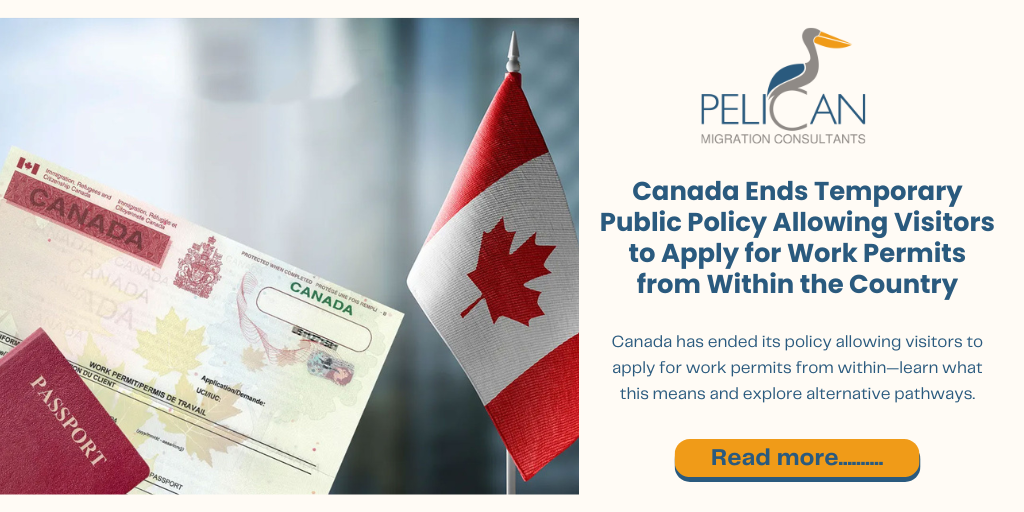
Canada Ends Temporary Public Policy Allowing Visitors to Apply for Work Permits from Within the Country: What You Need to…
As of August 28, 2024, Immigration, Refugees, and Citizenship Canada (IRCC) has officially ended the temporary public policy that allowed visitors in Canada to apply for work permits from within the country. This policy, introduced in August 2020, was a temporary measure implemented to address the challenges posed by COVID-19 pandemic-related travel restrictions. It provided visitors, who were unable to leave Canada, with the opportunity to apply for work permits without the need to exit the country.
With the policy now rescinded, it’s crucial for prospective immigrants and visitors to understand the implications of this change and explore alternative pathways to obtaining a work permit in Canada. This blog delves into the specifics of the policy’s termination, the reasoning behind it, and the viable alternatives such as Express Entry and Provincial Nominee Programs (PNPs) for securing work authorization in Canada.
The Temporary Policy: A Brief Overview
The temporary public policy was introduced as a solution for visitors in Canada who were stranded due to global travel restrictions. Under normal circumstances, visitors in Canada would have to leave the country and apply for a work permit from their home country or another country where they had legal status. However, the COVID-19 pandemic created unprecedented barriers to international travel, making it difficult for many foreign nationals to return home.
The policy allowed:
- Visitors in Canada to apply for a work permit without leaving the country.
- Foreign nationals who had held a work permit in the previous 12 months, but had since changed their status to “visitor,” to apply for a new work permit and begin working in Canada while waiting for a decision.
This policy was a lifeline for many during the height of the pandemic, offering a way to maintain legal status and work in Canada despite the challenges of the global situation.
Why the Policy Was Ended
The IRCC has decided to end this temporary policy earlier than its original expiration date of February 28, 2025. The rationale behind this decision is multifaceted:
- Recalibrating the Number of Temporary Residents: With the resumption of normal travel operations and the return to pre-pandemic immigration protocols, there is a need to manage the influx of temporary residents and ensure that Canada’s immigration system remains sustainable.
- Preserving the Integrity of the Immigration System: The IRCC has identified that some individuals were exploiting the temporary policy to work in Canada without proper authorization, undermining the integrity of the immigration system. By ending the policy, IRCC aims to curb such misuse and ensure that the process of obtaining work permits remains fair and regulated.
- Return to Standard Procedures: As Canada transitions out of the pandemic, there is a shift towards reinstating standard immigration processes. This move signals a return to the normalcy of applying for work permits from outside Canada, which aligns with the country’s broader immigration policies and procedures.
Impact on Visitors and Foreign Workers
For those who had already applied for a work permit under this temporary policy before August 28, 2024, the IRCC will continue processing these applications. However, new applications under this policy will no longer be accepted.
Visitors currently in Canada who were considering this route to obtain a work permit will now need to explore alternative options. The termination of the policy means that individuals will need to apply for a work permit from outside Canada, which could involve returning to their home country or another country where they have legal status.
Alternative Pathways: Express Entry and Provincial Nominee Programs (PNPs)
While the end of this policy may seem like a setback, there are still robust pathways available for those seeking to work and live in Canada. Two of the most prominent alternatives are the Express Entry system and Provincial Nominee Programs (PNPs).
1. Express Entry
Express Entry is Canada’s flagship immigration system, designed to manage applications for permanent residence under three main economic immigration programs:
- Federal Skilled Worker Program (FSWP): For skilled workers with foreign work experience who meet the minimum requirements in terms of work experience, education, and language proficiency.
- Canadian Experience Class (CEC): For individuals who have at least one year of skilled work experience in Canada within the last three years, coupled with strong language skills.
- Federal Skilled Trades Program (FSTP): For skilled tradespeople with qualifications in specific occupations and a valid job offer or a certificate of qualification in their trade from a Canadian province or territory.
Express Entry operates on a Comprehensive Ranking System (CRS), which assigns points based on factors like age, education, work experience, and language proficiency. Applicants with the highest scores are invited to apply for permanent residence through regular draws from the Express Entry pool.
Why Consider Express Entry?
- Permanent Residence: Unlike a work permit, Express Entry leads to permanent residency, offering long-term stability and the right to work in Canada indefinitely.
- Speed and Efficiency: The Express Entry system is one of the fastest routes to permanent residence, with processing times typically around six months.
- Opportunity to Improve CRS Score: Candidates can improve their CRS scores by gaining additional qualifications, improving language skills, or securing a job offer from a Canadian employer.
2. Provincial Nominee Programs (PNPs)
Provincial Nominee Programs (PNPs) allow individual provinces and territories in Canada to nominate immigrants who meet specific local labor market needs. PNPs are an excellent alternative for those who may not have a high enough CRS score to qualify through Express Entry alone.
Each province has its own set of criteria, targeting specific occupations or skill sets that are in demand within the province. Some PNPs are aligned with Express Entry, meaning that candidates who receive a provincial nomination are awarded an additional 600 CRS points, virtually guaranteeing an invitation to apply for permanent residence.
Why Consider PNPs?
- Tailored to Provincial Needs: PNPs offer a pathway for individuals whose skills and experience align with the specific labor market needs of a province.
- Higher Chances of Selection: Candidates who may not qualify through Express Entry due to a lower CRS score can benefit from the additional points provided by a provincial nomination.
- Express Entry Alignment: Many PNPs are aligned with Express Entry, streamlining the process for obtaining permanent residence.
How Pelican Migration Consultants Can Assist You
Navigating the complexities of Canadian immigration can be challenging, especially with recent changes in policies. Here’s how Pelican Migration Consultants can help:
- Expert Guidance on Policy Changes: Our team stays up-to-date with the latest immigration policies and will guide you through how these changes affect your situation.
- Tailored Immigration Pathways: We assess your profile and recommend the best immigration pathways, whether through Express Entry, PNPs, or other suitable options.
- Comprehensive Application Support: From document preparation to submission, we handle every step of the application process to ensure accuracy and compliance.
- Maximizing CRS Scores: We offer strategies to improve your CRS score, increasing your chances of receiving an invitation to apply for permanent residence.
- Job Search Assistance: For those seeking to work in Canada, we provide guidance on job search strategies and connect you with resources to secure employment.
Conclusion
While the end of the temporary policy allowing visitors to apply for work permits from within Canada may seem like a hurdle, there are still viable pathways to achieving your Canadian dream. Whether through Express Entry or PNPs, Pelican Migration Consultants is here to help you navigate the journey with confidence. Contact us today to explore your options and take the next step towards a successful immigration experience.
FAQs
1. What was the temporary public policy that allowed visitors in Canada to apply for work permits?
The temporary public policy, introduced by Immigration, Refugees, and Citizenship Canada (IRCC) in August 2020, allowed visitors in Canada to apply for a work permit without needing to leave the country. This policy was put in place to help visitors who were unable to return to their home countries due to COVID-19-related travel restrictions. It also allowed foreign nationals who had held a work permit in the previous 12 months and had changed their status to "visitor" to apply to work while waiting for a decision on their new work permit.
2. Why did the IRCC end this policy ahead of its original expiration date?
The IRCC ended the policy on August 28, 2024, to recalibrate the number of temporary residents in Canada and preserve the integrity of the immigration system. The policy was initially set to expire on February 28, 2025, but was terminated early to prevent misuse by individuals who were exploiting the policy to work in Canada without proper authorization. The decision aligns with Canada's efforts to return to standard immigration practices as the pandemic-related circumstances have improved.
3. What options are available for visitors who want to work in Canada now that the policy is ended?
With the end of the temporary policy, visitors who wish to work in Canada must apply for a work permit from outside the country. This involves returning to their home country or another country where they have legal status and submitting an application there. Alternatively, potential immigrants can explore other pathways, such as the Express Entry system or Provincial Nominee Programs (PNPs), which offer routes to permanent residence and employment in Canada.
4. How can I improve my chances of getting selected through the Express Entry system?
To improve your chances of being selected through the Express Entry system, you should focus on increasing your Comprehensive Ranking System (CRS) score. Key ways to do this include enhancing your language proficiency (IELTS or CELPIP scores), gaining additional work experience, obtaining a job offer from a Canadian employer, or securing a provincial nomination through a Provincial Nominee Program (PNP). Each of these factors can significantly boost your CRS score and increase your likelihood of receiving an Invitation to Apply (ITA) for permanent residence.
5. How can Pelican Migration Consultants assist me with my immigration journey to Canada?
Pelican Migration Consultants can help you navigate the complex Canadian immigration process by providing expert guidance on policy changes, identifying the most suitable immigration pathways for your profile, and offering comprehensive application support. We also assist in improving your CRS score, preparing for language tests, and advising on job search strategies to enhance your chances of a successful application. Our team stays up-to-date with the latest immigration policies and ensures that you are well-prepared for each step of your journey.


